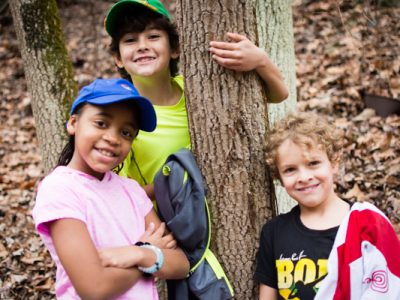Renaming Monkeyland
 In January Miquon students and staff gathered for an assembly to honor Dr. Martin Luther King, Jr. At the assembly, groups shared what they have been learning from Dr. King’s work and the importance of speaking up and working together toward a more equitable and just world.
In January Miquon students and staff gathered for an assembly to honor Dr. Martin Luther King, Jr. At the assembly, groups shared what they have been learning from Dr. King’s work and the importance of speaking up and working together toward a more equitable and just world.
On the 25th of the month, Miquon students in first through sixth grade took on a conversation about a situation here at Miquon that is in direct conflict with our school philosophy, as well as the possibilities ahead of us to make things better. Like Dr. King, our students worked as advocates for justice as they took part in conversations about letting go of the use of the name Monkeyland at Miquon.
History of Monkeyland
Many years ago, the Harts Lane side of the woods along the upper creek was full of foliage, including vines children used for swinging. Students in those days decided that the area should be called Monkeyland, because they imagined themselves swinging as monkeys might, and the name stuck. We know the use of this name was never meant to be hurtful.
Now, the creek bank is no longer covered in vines and, while children still love playing there, there is no vine swinging. Instead, the name Monkeyland is confusing and offensive to many.
All around us we see examples of references to monkeys being made about African American people, conveying racist suggestions of African Americans being lesser people. Many know about the recent advertisement from H&M clothing company that similarly caused a lot of discomfort for many people by showing a photo of a black boy in a shirt that said “Coolest Monkey in the Jungle.”
An Understanding at the Kid Level
In developmentally appropriate ways, our teachers brought this topic to their students, sharing both the ways the word monkey has been used to put others down, as well as the decision that Miquon will no longer use the name Monkeyland.
The conversations were reflective and thoughtful. Our children expressed dismay at the idea of anyone treating African Americans, or any people, as less valuable than others. All around the school, kids expressed a desire to make sure that we at Miquon were not contributing to a situation that hurts anyone.
As they worked through their classroom discussions, students clearly understood the pain that the word “monkey” brings when referring to anything other than an actual monkey.
The overall sense of the discussions is best summarized by the third grader who asked, “What took us so long to change it?”
Teaching Social Justice
When we think about the ways in which we teach our students about social justice, we strive to make lessons as relatable as possible for young children.
The renaming of Monkeyland is such relevant subject matter that is near and dear to the hearts of many Miquon students, because it is a place they know intimately as a part of our campus where many spend time every day — climbing, building, imagining. In many ways, there could be no better example for our Miquon children of how to stand up for something that’s wrong in their world.
This is just the beginning of the renaming work here at school. Recently, fifth and sixth graders facilitated a Good of the School assembly to determine a process by which we will rename the area. Later, older children will talk with Nursery and Kindergarten students to help them understand the process and to invite their participation in the work moving forward.
It is so important to us as Progressive educators that this work, much as the original naming of the location, be led by students. This space is theirs and their agency and ownership are essential in this process.
We look forward to sharing more about their process and the results of their naming deliberations soon.
10 Responses to Renaming Monkeyland